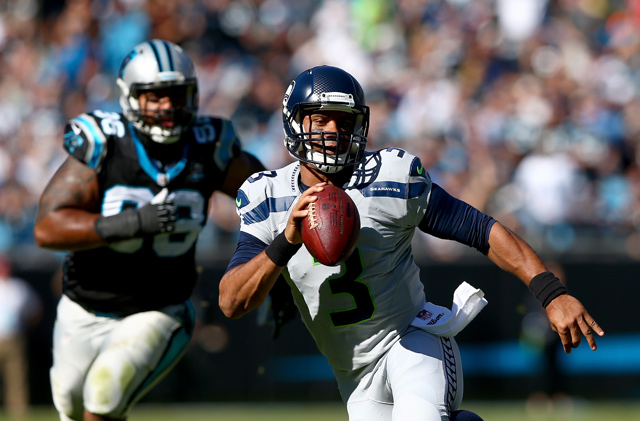Seattle Seahawks quarterback Russell Wilson really isn’t moved by this newfound fascination with whether he’s "not black enough." Amid reports of locker room strife and alleged complaints from other black teammates that put his racial identity into question, Wilson told reporters:
"I think it was people trying to find ways to knock us down, but we just keep swinging and keep believing in each other. We keep believing in the people that we have in the room and we keep believing in the coaching staff. We keep believing in our fans, we keep believing in each other and there is no doubt that we are together. There is no doubt that we are more together than ever before.
"And so, in terms of me, the ‘not black enough’ thing I think you are talking about, I don’t even know what that means. I don’t know. I believe that I am an educated, young male that is not perfect. That tries to do things right, that just tries to lead and tries to help others and tries to wins games for this football team, for this franchise. And that’s all I focus on."
That didn’t stop NBA legend and current sports analyst Charles Barkley from blaming black folks in an interview on Philadelphia radio. "For some reason we are brainwashed to think, if you’re not a thug or an idiot, you’re not black enough. If you go to school, make good grades, speak intelligent, and don’t break the law, you’re not a good black person. It’s a dirty, dark secret in the black community."
But as Gina Torres writes at For Harriet, "there is no single definition of ‘black people.’ Torres continues:
"Black people–including African-Americans and other descendants of the African Diaspora–are not a monolith. We are all shaped by our various experiences, socioeconomic backgrounds, and geographical location. But given the fact that mainstream society often uses the behavior of one Black person to represent us all, Barkley’s broad generalization is extremely myopic and disappointing. His statements allow for non-Black people to sign off on this highly problematic sentiment."
Whenever a premiere NFL team hits a rough patch and loses a couple of games, there’s talk of trouble in the locker room. Obviously, this attack on Wilson seems deeply personal, but chances are, if his team keeps winning, the talk will die down significantly.
